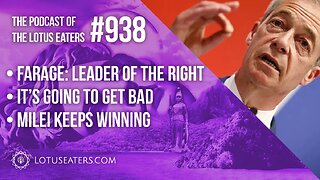Episode 1835: Is emotionalism negating Christ?
I want to give you a quote for today before going into this episode.
"When one has nothing more to lose, the heart is inaccessible to fear." St. Theodore Gurin
You know something has been bothering me about my association with the Italian Club I belong to and the San Rocco Society I belong to. Where is my representation of Christ in these clubs? I mean I may lead prayer before meals but Whoopi what is that? This morning I woke up and said Speak Lord for your Servant is listening and as I am making my morning coffee I started to review the posts on a Facebook site I created for the neighborhood starting in 2020 and the site has taken off very well. Getting close to 11,000 members. As I reading the posts I am noticing a lot of emotions and as is the case once on Facebook you see other personal sites that have people posting things about highly emotional matters.
Then I thought about all the discussions with my friends at these clubs I spoke about, and it hit me like a ton of bricks “Where is Christ in any of this?” Truthfully even with the San Rocco Society, Christ is intentionally left out. So that caused me to text one of the leaders of San Rocco and ask if he would allow me to have a talk presented by a priest on the importance of Lent. His response was great telling me what you need done. Wow that was easy. Emotionalism just got relaced with Christ.
That is what this episode is about. I emotionalism replacing Christ?
“Your emotions are the slaves to your thoughts, and you are the slave to your emotions. ― Elizabeth Gilbert
Title: "Discerning the True Path: A Traditional Catholic Perspective on Emotionalism in the Spiritual Journey"
When we see the great involvement with our current culture in such social media sites like Tic Tok, Instagram and Facebook you will notice a huge surge in emotionalism has become a concern.
My question is “Is emotionalism negating God?” There is a cyclical nature of emotionalism and its relationship to Christ, it is important to view these dynamics through the lens of traditional Catholic teachings.
There is often a desire for a personal emotional high or an emotional means to alleviate fears and past experiences. This is where the allure lies in the pursuit of a happy ending without the necessary effort.
Analyzing this inclination from a Catholic perspective underscores the potential danger of elevating subjective emotions over reason and rationality. This shift can result in a superficial and narcissistic pattern as we see today, prioritizing emotion and conflict drama over the measured progress that comes from a disciplined spiritual journey.
In the rich history of Catholic history, the Church has consistently emphasized the importance of a balanced and rational approach to spirituality. St. Thomas Aquinas, once stated, "Wonder is the desire for knowledge," which highlights the significance of seeking understanding with a reasoned mind.
The rise of emotionalism in our culture and also various religious and spiritual movements, both in the East and West, has historically been cautioned against within the Catholic tradition. The Church encourages believers to approach their faith with a deep understanding of doctrine and a commitment to reasoned discernment.
Lets first look at the emotionalism that comes with tragedy or loss in our life that everyone seems to want to share socially especially on Facebook. Many posts showing loved ones with statements about either the heavy loss they are experiencing or at times the assumption of where that person is in heaven like “My Fathers or Mother or Sister or Brother or friends Heavenly Birthday” This presumption of Christs judgement due to emotionalism.
Job 40:1-5
"And the Lord answering Job out of a whirlwind, said:
Gird up thy loins like a man: I will ask thee, and do thou tell me. Wilt thou make void my judgment: and condemn me, that thou mayst be justified? And hast thou an arm like God, and canst thou thunder with a voice like him?
Clothe thyself with beauty, and set thyself up on high, and be glorious, and put on goodly garments."
This emphasizes the humility and acknowledgment of God's sovereignty. In this passage, God is responding to Job, who had questioned the justice of his suffering. The Lord's speech from the whirlwind is a powerful reminder of God's incomprehensible wisdom and authority.
Gird up thy loins like a man: This phrase is a call to Job to stand firm and face the divine questioning with courage and humility. It implies a challenge for Job to prepare himself for a serious and profound dialogue with God.
Wilt thou make void my judgment: God questions whether Job is in a position to challenge or nullify God's judgments. This highlights the importance of recognizing the divine authority and wisdom inherent in God's actions.
And hast thou an arm like God: This metaphorical language emphasizes the vast difference between God's power and human capabilities. It underscores the limitations of human understanding compared to the divine.
Clothe thyself with beauty: This phrase could be interpreted as an invitation for Job to acknowledge the glory and majesty of God. It may suggest that, instead of questioning God's justice, Job should recognize God's inherent goodness and righteousness.
The overall message from God is a reminder to Job of the greatness and wisdom of God. It is a command of humility and trust in God's plan, even in the face of suffering and difficulty. The traditional Catholic interpretation emphasizes the importance of submitting to God's will and recognizing the divine order, even when it may seem mysterious or challenging to human understanding.
In the 21st century, the manifestation of emotionalism in social justice movements and Goddess-centered worship is a cause for concern. While individuals may transition between seeking the answers themselves instead of the representation of the divine, the Catholic perspective emphasizes the importance of anchoring faith in the unchanging truths of Catholic doctrine and not social media or the “my feelings and my truths of this 21st century”. Neither your feelings (emotions) or your truths (Emotionalism) me anything.
Examining the roots of emotionalism in the modern era, from the gurus of the 1970s to feminist spirituality, reveals a recurring pattern that challenges the stability of a faith grounded in reason. Catholic teachings urge believers to be discerning, avoiding the pitfalls of emotionalism, and remaining steadfast in the timeless truths of the Church.
As we confront this new emotional cycle, the wisdom of the Catholic saints guides us. St. John of the Cross, said, "In the evening of life, we will be judged on love alone." This love is not a fleeting emotional experience but a profound and enduring commitment to God and His teachings.
The crucial question surfaces: Are you seeking redemption or salvation? While these terms may sometimes be used interchangeably, Catholic theology emphasizes their nuanced distinctions. Salvation involves protecting oneself from corruption through right action, while redemption, often associated with evangelism, involves the transformative power of spreading the Catholic Faith in all we do and say.
In Catholic understanding, redeeming oneself involves a profound internal transformation guided by the grace of God. It is not a temporary emotional experience reliant on external stimuli but a continual process of growth and sanctification.
In conclusion, the rise of emotionalism calls for a vigilant discernment from a traditional Catholic perspective. Understanding this pattern through the lens of Catholic teachings enables believers to navigate the current wave of emotionalism, cultivating a spiritually resilient journey grounded in reason, love, and devotion to God.
The main question as Catholics is do we really believe in God? Do we really believe that Christ came to set an example for us and through the lives of the great saints of the Church has been constantly sending us the message of get your head right and do not look to either each other or your modern culture for the answers? Do you see redemption in suffering? Is suffering something we should embrace in order to get glory from it or is it simply just another opportunity to post on social media?
During lent try something different. Stop posting. Yes stop posting and start trying to look at your like from a pure spiritual sense. Say to yourself “Should I post this or should I take that same amount of time and pray.”
I want you to listen to a talk by one of my favorite priests on “The glory only comes through suffering”
Now go out and convert somebody during lent.
-
 5:30
5:30
Power Slap
3 days agoThe Craziest Character in Power Slap! | Best of Turp Daddy Slim | Power Slap 8
14.8K12 -
 58:57
58:57
The Dan Bongino Show
4 hours agoIs This How They’re Going To Try And Steal It? (Ep. 2272) - 06/17/2024
387K754 -
 1:18:47
1:18:47
The Rubin Report
3 hours agoBiden Fundraiser with Jimmy Kimmel & Hollywood Elite Ends in Disaster
43K48 -
 2:09:21
2:09:21
Steven Crowder
5 hours ago🛑 Here's How Google Is Going to Steal the Election Again | Guest: Dr. Robert Epstein
254K323 -
 17:53
17:53
Breaking Points
4 hours agoMSNBC Clown COPE After Biden OLD MAN Moments
21.6K27 -
 1:08:14
1:08:14
Mostly Sports With Mark Titus and Brandon Walker
21 hours agoMostly Sports With Mark Titus and Brandon Walker Presented by Jägermeister | EP 190 | 6.17.24
22.4K2 -
 10:55
10:55
Dr Steve Turley
3 hours agoBiden HUMILIATED on Stage as Trump Support SKYROCKETS!!!
37K42 -
 1:14:19
1:14:19
Graham Allen
6 hours agoPROOF Biden is Obama’s puppet! + Crowd ROARS For Trump In Detroit!
72.4K123 -
 2:12:03
2:12:03
Matt Kohrs
22 hours agoNew Market Highs, GameStop Annual Meeting & The Week Ahead || The MK Show
47.3K5 -
 1:40:43
1:40:43
The Podcast of the Lotus Eaters
8 hours agoThe Podcast of the Lotus Eaters #938
59.9K20